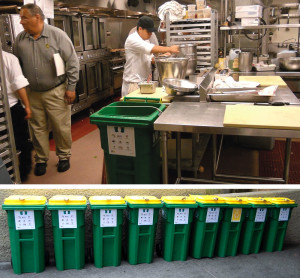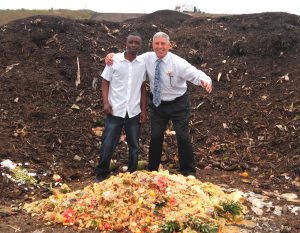The city has assisted participant hotels in increasing their overall diversion rates — in some cases, by 400 percent or more.
Ana Carvalho
BioCycle January 2014

The Lodge at Torrey Pines, as well as other hotels in the program, has been recognized under the City’s Annual Waste Reduction and Recycling Awards Program. Placement of the organics cart in the kitchen (above), as well as filled carts lined up for collection, are shown.
Hotels are encouraged to work on source reduction and donate excess edible food. Most of the participating hotels use their excess edible food in the employees’ cafeterias, but as with many other businesses, they are still resistant and afraid of food donation programs. City staff provides educational material on the Bill Emerson Good Samaritan Act, the Internal Revenue Service Code’s Allowable Deductions for Charitable Donations to Ordinary Income Properties, and a list of local charities and food banks that will work with them to implement a safe and smooth excess edible food donation program.
As part of the program requirements, hotel staff and a representative of their hauler have to inspect the hotel’s first three food scraps loads with City staff at the Miramar Greenery, to ensure that any contamination issues are identified, and properly addressed back at the hotel. With this comprehensive approach to waste diversion, i.e., not just a food waste composting focus but also waste prevention and donation, San Diego has assisted participant hotels in increasing their overall diversion rates — in some cases, by 400 percent or more, and even achieving over 80 percent waste diversion. Table 1 illustrates diversion achieved by several hotel participants.
Hotel Achievements
The Hilton San Diego Bayfront Hotel was the first hotel to participate in the food scraps composting program in May 2010. The hotel was eager to get started, and had the fastest program implementation of all hotels: only one month, and that included training over 100 staff members! Most hotel programs take an average of three to four months to be fully implemented (including the implementation of the City Recycling Ordinance’s requirements).

The program requires that hotel staff and a representative of its hauler inspect the hotel’s first three food scraps loads with City staff at the Miramar Greenery. A clean load from the Crowne Plaza Hotel is being celebrated.
Current participant hotels generate an average of 0.85 lbs/meal of food waste. It is interesting to note that hotels participating in an excess edible food donation program, in addition to using it in the employees’ cafeteria, have an average of only 0.49 lbs of food waste per meal. Hotels that donate excess edible food also typically realize a great cost savings on their disposal bills. The amount saved depends on such variables the specific collection programs and fees charged by the individual haulers. Table 3 shows a comparison based on the average food waste/lbs.
All program participants are presented with a yearly seal of participation to be displayed at their facilities. In addition to the training the City provides, several hotels have created their own waste diversion outreach tools for employees, such as videos, recycling fashion show, and games. The Hilton San Diego BayFront, Crowne Plaza, Sheraton Hotel and Marina, Marriott Marquis, The Grand Del Mar, and The Lodge at Torrey Pines have already been recognized under the City’s Annual Waste Reduction and Recycling Awards Program. Future awards will recognize new program participants with exemplar waste diversion rates.
Ana Carvalho is an Environmental Specialist with the City of San Diego’s (CA) Environmental Services Department.










